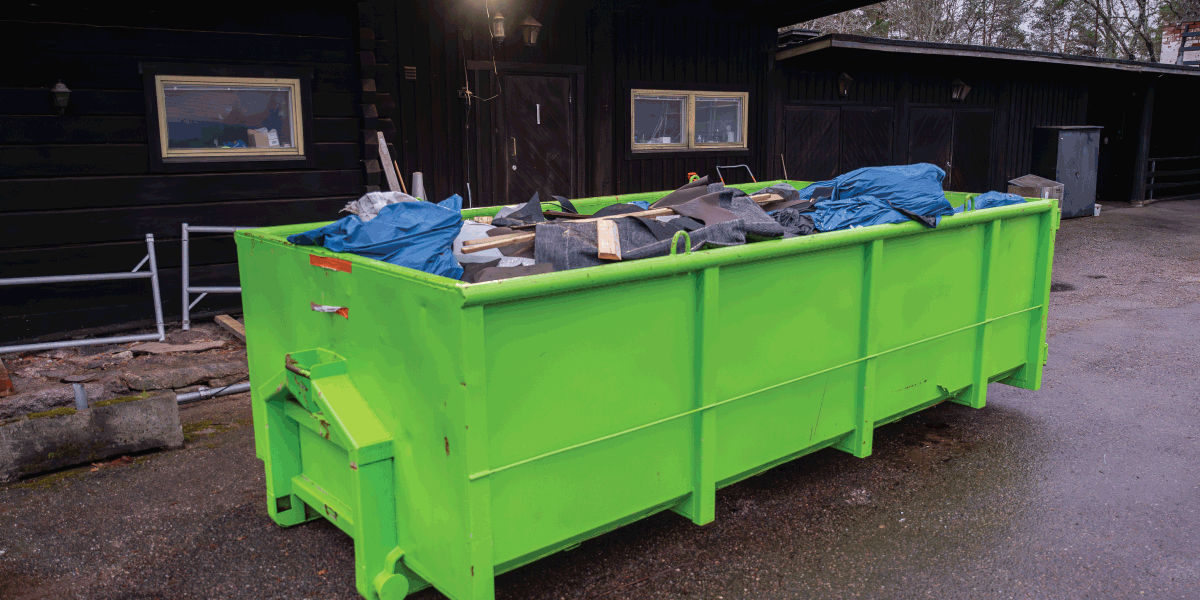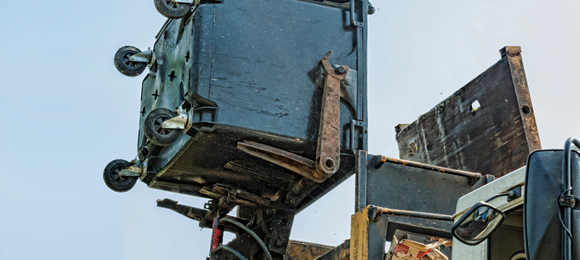
Updated November 18, 2025
Renovating your kitchen, basement, or bathroom can be one of the most exciting upgrades to your home, but it also creates a surprising amount of debris. Old cabinets, drywall, flooring, and scrap wood pile up fast, and most household trash bins can’t handle it. That’s where a dumpster rental comes in.
Renting a roll-off dumpster makes cleanup faster, safer, and more efficient, but only if you know what to expect.
Who This Guide Is For
Homeowners rent dumpsters for all kinds of renovation projects, big and small. You might be:
-
Doing the demolition yourself on a kitchen or bathroom remodel and need a convenient place to toss old materials
-
Hiring a handyman or small crew to handle the demo, but it’s up to you to arrange the dumpster
-
Tackling a full DIY renovation, where you’re managing both demolition and construction
-
Overseeing multiple contractors for a larger project, and you want to keep waste removal organized
-
Preparing your home for sale and removing fixtures, furniture, or other junk and debris before staging
No matter which situation fits you, this guide will help you understand how dumpster rentals work, what questions to know before renting, and how to avoid common mistakes.
Table of Contents:
- How to Choose the Right Dumpster for Your Renovation
- What to Know Before Renting
- What to Expect During Delivery and Pickup
- How to Maximize Your Dumpster Rental
- Common Mistakes Homeowners Make
- Bonus Tips
See real local dumpster prices
Request availability and pricing from dumpster
rental companies near you.
How to Choose the Right Dumpster for Your Renovation
Choosing the right size dumpster is one of the most important parts of a smooth project. If it’s too small, you’ll pay for multiple hauls; too large, and you’ll overspend on unused space.
| Project Type | Recommended Size | Notes |
|---|---|---|
| Small bathroom remodel | 10 yard dumpster | Great for tile, drywall, small fixtures |
| Kitchen renovation | 15-20 yard dumpster | Can handle cabinets, countertops, and appliances |
| Whole-home renovation | 30 yard dumpster | Best for large volumes of debris |
| Roofing project | 10-15 yard dumpster | Ideal for shingles and underlayment |
Pro Tip: Always round up in dumpster size if you’re unsure. It’s cheaper to have a little extra room than to pay overage fees for going over the weight limit.
What to Know Before Renting
Before booking your dumpster, clarify the details. Every dumpster company operates differently, so it pays to look at the fine print.
When you book with Hometown, you'll see all pricing details. Each company's transparent pricing details include all necessary information, like the rental period length included in the cost, as well as the cost of extending your rental period, what items you're prohibited from placing in the dumpster, and how much weight is included in the dumpster price and the cost per ton if you exceed that weight.
1. What is the rental period?
Most dumpster rentals last 7-10 days. Companies typically offer the option of extending your dumpster rental period, charging a small fee around $50-$100 per day on average.
2. What items are prohibited?
Paints, solvents, tires, electronics, and appliances often aren’t allowed due to disposal regulations. Ask for a full list so you can plan ahead.
3. What are the weight limits and overage fees?
Weight limits vary by dumpster size and material type. Heavy debris like concrete or roofing shingles can reach the limit quickly. Knowing how much different C&D debris weighs or how much general junk weighs will help you know you're renting the right size for your project.
4. Do I need a permit?
If the dumpster will sit on the street or sidewalk, your city may require a dumpster permit. Your provider can usually help you obtain one.
5. Where will the dumpster be placed?
Make sure there’s enough clearance for the delivery truck and protect your driveway with plywood if needed.
What to Expect During Delivery and Pickup
Delivery
The driver will need a clear, flat surface for placement. Move vehicles out of the way, and if possible, mark your preferred spot with cones or tape. Placing plywood under the dumpster helps protect driveways from scratches or cracks. Oftentimes, companies provide boards for under the dumpster themselves.
Pick-up
Once you’ve filled the dumpster, it will be picked up on the scheduled pick-up day. However, you can often call and let the company know your dumpster is ready for pick-up if you're done filling it before your rental period is up. Some companies require 24-48 hours’ notice, so keep that in mind as well. If your project runs long, don’t wait until it’s full. Extend your rental before it expires to avoid daily overage fees.
Pro Tip: Take photos of your driveway or yard before and after delivery. It helps resolve any disputes if damage occurs, though this is rare.
How to Maximize Your Dumpster Rental
1. Plan ahead.
Know when major demo days will happen and time delivery accordingly. Having the dumpster arrive too early or late can waste money.
2. Pre-sort debris.
Separate heavy materials like tile or concrete from lighter items. This helps balance weight and makes recycling easier.
3. Avoid overfilling.
Keep waste below the top edge of the dumpster. Most haulers won’t pick up an overloaded container for safety reasons.
4. Recycle when possible.
Ask your provider about recycling options for metal, wood, or cardboard. Some companies offer discounts for recycling clean loads.
If multiple people are using a dumpster, like on a job site, label what goes in which dumpster to prevent accidental dumping of prohibited items or contaminating "clean loads."
Common Mistakes Homeowners Make
-
Renting too small a dumpster. It’s the most common mistake, but is easily avoidable. Estimate how many cubic yards (3 ft x 3 ft x 3 ft or roughly the size of a kitchen stove) of debris you have and estimate how much the debris will weigh.
-
Ignoring prohibited item rules. Tossing in paint cans or electronics can result in fines. Different companies have different prohibited items. When you book with Hometown, you'll be provided clear information on what is and
-
Not checking weight limits. A half-full dumpster with dense debris can still exceed limits. If you're disposing of heavy debris, make sure you abide by the company's directions. Often, you're limited to filling the dumpster halfway or less.
-
Overfilling or blocking access. If your dumpster is filled above the fill line inside, or if there is insufficient access, the truck driver has the right to refuse pickup if it’s unsafe to pick up the dumpster and haul it,.
-
Forgetting about permits. Many neighborhoods and HOAs have placement rules and limits to how long a dumpster can be placed in your driveway. Check before delivery and make sure you abide by said rules to avoid any HOA headaches.
Bonus Tips
-
Schedule delivery early in the week for better availability and quicker swap-outs.
-
Check weather forecasts. Cover your dumpster if rain or snow is predicted to prevent water-logging debris and adding weight. Learn more about preparing for rain or severe weather during a dumpster rental.
-
Don't assume volume equals weight. Heavy debris like concrete, stone, or tile can quickly reach weight limits, so double check how much weight is included in the dumpster's price before booking.
-
Check driveway clearance for trucks. Some residential driveways and streets are too narrow, requiring on-street or off-street parking. If that's the cases, you'll likely need a dumpster permit.
Whether you’re doing your own demolition, coordinating with a handyman or local demolition company, or managing a full home renovation, understanding how dumpster rentals work will save you time, money, and stress. By asking the right questions and planning ahead, you’ll keep your project running smoothly from demo to cleanup.
Need help finding a reliable dumpster rental service near you? Use Hometown to compare local providers, request quotes, and get your renovation cleanup handled the right way.


